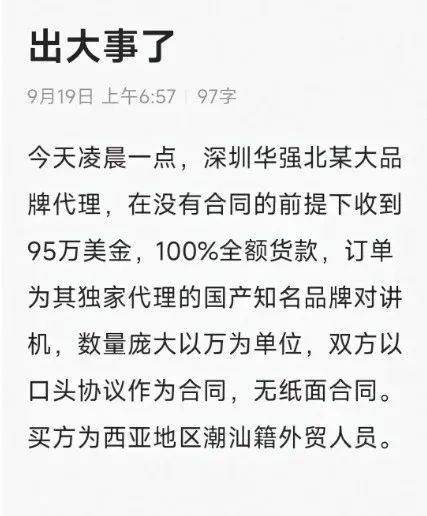7,590 kilometers apart, Lebanon needs a Huaqiang North
![]() 09/24 2024
09/24 2024
![]() 514
514

Edited by Liu Jingfeng
Chan Wing-yan: "Damn, it's all junk again. Can't the police department afford something more advanced?"
Sir Wong: "How about one that's implanted in the body?"
- "Infernal Affairs", first rooftop conversation
Beepers never imagined that they, often appearing in a nostalgic light in film and television works, would end up on the front page of the news in such a brutal way today.
On September 17, a beeper carried by a member of Lebanon's Hezbollah exploded, killing 12 people and injuring about 2,800. On the afternoon of September 18, another series of walkie-talkie explosions occurred in various locations in Lebanon. CCTV News cited the latest news from Lebanon's Ministry of Public Health that the explosions of communication devices such as walkie-talkies had resulted in 20 deaths and over 450 injuries.
Magical, yet truly happening. According to BBC reports, within the following 24 hours, 60-70% of the injured had one eye removed. A Lebanese doctor recounted, "The number of necrotic eyeballs removed in a single night exceeded the total number I have removed throughout my entire career."
Reading the literal meaning of these news items alone makes everything seem too abstract, prompting a series of questions:
Dude, it's 2024 already. Who's still using beepers?
What? A simple electronic device like a beeper can explode?
Are the electronic devices in my hands still reliable?
At the forefront of public opinion, speculation abounds that Huaqiang North, known as "China's First Electronics Street," has received large orders. Middle Eastern businessmen have specifically requested our products, insisting on 100% pure Chinese manufacturing.

Image source: Internet
Friends, Chinese don't deceive Chinese. Our pride and self-esteem should be grounded in objective facts. Stubbornly adhering to feelings of pride alone is a dangerous practice.
In fact, after recent visits to various markets in Huaqiang North, Xiaguang News found that beepers, which have virtually no consumer demand, were rarely seen, while walkie-talkies were abundant. Many shopkeepers at the counters said, "We haven't seen Middle Eastern customers buying walkie-talkies. They mostly come here to buy innovative 'high-end products.'"

Perhaps the beeper's weak signal means we'll have to wait a bit longer for this pie from the sky. (This is a pretty high-level humor, hehe)
One reason for the slow market response is that it takes time. Another reason is that there isn't as much demand as rumored. Let's take a look at who's still using beepers these days.
In fact, old-fashioned beepers haven't completely disappeared; they've evolved to serve more specific needs in the context of industrial upgrading. According to Cognitive Market Research, the global pager market was valued at USD 1.6 billion in 2023, with a projected CAGR of 5.90% from 2023 to 2030.
There's a market, and it's growing. Because pagers are one-way devices that receive information but cannot send it, they can convey critical information faster and more accurately, making them a key requirement in specific scenarios like hospitals, emergency response, and firefighting.
According to Cognitive Market Research, the two largest pager markets globally are North America and Europe. For example, Critico, a global paging communication brand based in the UK, focuses on critical communication solutions, providing services to industries that require 24/7 availability, such as firefighting, emergency response, energy maintenance, and outdoor rescue.
There are also scenarios closer to consumers, albeit with low user retention and a small market. Cognitive Market Research mentions that pagers can be an option for consumers who want to reduce smartphone distractions or parents who want to protect their children from smartphone influence. Additionally, in some restaurants, pagers are used as beepers to call customers for their tables.
In fact, in the currently conflict-ridden Lebanon, members of Hezbollah widely use pagers, partly to evade Israeli surveillance. Due to their one-way receiving capability, pagers are difficult to locate, and using a dedicated network reduces the risk of hacking and data theft. For instance, in the "Fallen" trilogy starring Gerard Butler, pagers become the sole reliance for transmitting critical information after communication and command systems collapse.
Unexpectedly, this directly turned users into precise targets for attacks.
In a letter sent to the UN Security Council on the same day, the Permanent Mission of Lebanon to the United Nations stated that the Lebanese government's preliminary investigation found that the communication devices had been implanted with explosives before arriving in the country, and that electronic signals were sent to detonate them.
The tragedy has occurred. However, its broader impact lies in the sudden collapse of trust in everyday communication devices or electronic devices and their supply chains among people in other Middle Eastern regions. Many netizens even went as far as to dismantle their devices in online videos.
It's worth reflecting on what guarantees the credibility of the global industrial chain.
It's worth mentioning that the Middle East has a foundation in consumer electronics manufacturing but has yet to form a complete and mature industrial chain. In terms of upstream electronic component manufacturing, while some Middle Eastern countries have a certain scale in producing basic electronic components like resistors and capacitors, they rely heavily on imports for high-end electronic components such as advanced chips and sensors.
In terms of product assembly, although some regions with lower labor costs, such as Egypt and Turkey, have assembly lines established by foreign or local companies, their technical level, production efficiency, and scale still lag behind large manufacturing facilities in Asia.
Research and development capabilities are even more lacking, with a deficiency in internationally influential consumer electronics brands and R&D centers. These regions struggle to compete with companies in Europe, America, and Asia in product innovation and technological development.
The weak domestic manufacturing sector ultimately results in the Middle East's heavy reliance on imports for consumer electronics products. To ensure the safety of imported products, countries in the region have implemented various certifications to enhance security, such as the IEC certification established by the International Electrotechnical Commission (IEC), which is globally recognized as a benchmark for electrical and electronic product safety, performance, and compliance.
Furthermore, individual countries in the Middle East have their specific certification requirements. For example, in Saudi Arabia, SASO certification is crucial for importing electronic products, ensuring they comply with Saudi technical standards and safety regulations and passing rigorous testing and evaluation at designated laboratories. Saudi Arabia also implements pre-shipment inspection to ensure the quality and safety of imported products.
The United Arab Emirates has the ECAS certification, which requires electronic products to meet specific quality and safety standards and pass corresponding tests and evaluations. The UAE also implements a series of special regulatory measures for imported electronic products, such as restricting the import quantity of certain products or requiring importers to provide specific supporting documents. Similarly, Qatar, Kuwait, Oman, Bahrain, and other Middle Eastern countries also have their certification agencies and specific certification requirements.
Even so, tragedies like this one still occur.
The Middle East has attempted industrial reforms in the past. In modern times, Muhammad Ali of Egypt embarked on an industrialization journey, establishing modern industries focused on military production. However, due to British interference, factories closed down, worker numbers plummeted, and the industrialization process was disrupted.
As a historical hub for trade and commerce between the East and West, Arabs have profited handsomely by acting as intermediaries in East-West trade. This commercial tradition has inclined people in the region towards trading activities rather than industrial production. Meanwhile, abundant oil and natural gas resources have brought economic gains to Middle Eastern countries, with significant funds and resources invested in oil extraction and related industries.
As a favored child endowed with resources and a thriving commercial trade, the Middle East lacks a sense of urgency to develop manufacturing. This has led to a monolithic industrial structure and the absence of a solid manufacturing tradition.
Nonetheless, the Middle East is attempting to break this stalemate. In June this year, Saudi Arabia announced the establishment of the National Semiconductor Center, aiming to attract 50 fabless chip design companies by 2030 and create related industrial parks. The kingdom also plans to establish data centers, AI companies, and chip manufacturing bases, potentially housed in industrial parks. In the United Arab Emirates, Statevolt, headquartered in California, is investing approximately USD 3.2 billion to build a superfactory for semi-solid battery production in the alghail industrial park in the Ras Al Khaimah Economic Zone, aiming to drive the development of related electronic manufacturing industries in the surrounding area. Even Lenovo has established a new regional headquarters for the Middle East and Africa in Riyadh, Saudi Arabia, and constructed a manufacturing base for personal computers and servers.
However, building a moat for manufacturing, especially a full industrial chain, requires brick by brick and time. In comparison, having the capability to manufacture across the entire industrial chain throughout history is indeed a fortunate endowment.
As the world's factory for consumer electronics, China's manufacturing services have established a reputation for safety and reliability globally. This incident underscores the importance of securing the supply chain of consumer electronics products within one's own hands, not merely a competition of superiority but also a respect for life.
A concerned netizen discovered that on September 17, a patent titled "An Anti-tampering Circuit, Control Method, and Walkie-talkie" became effective for a leading domestic wireless communication enterprise.
Statistics show that China is the largest source of household appliances and consumer electronics imports for the United Arab Emirates, accounting for approximately 51% of its total imports. In addition to direct manufacturing and material procurement services, domestic contract manufacturers also participate in product development and design and the research and development of some components, playing a trustworthy role in ensuring the safety of the consumer electronics supply chain.
By keeping technology in the hands of civilization, a steady stream of large orders will undoubtedly follow.








